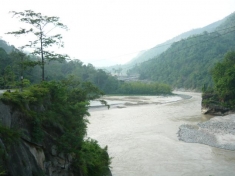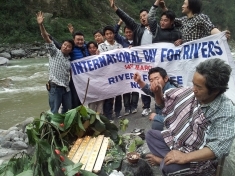Government Scraps Four Proposed Dams on the Teesta River in India
In a significant move for communities across Northeast India fighting the construction of harmful dams, on June 10th the government of Sikkim announced plans to scrap the construction of four hydroelectric power projects on the Teesta River. The 99 MW project at Bop, the 99 MW at Bhimkang, the 99 MW at Lachung, and the Lachen Teesta Stage-I 280 MW project were all rejected by the state government for a variety of factors, including strong public opposition, concern over potential environmental impacts, and apprehensions following the 6.9 magnitude earthquake that hit the region on September 18th, 2011.
Sikkim, a land-locked and predominantly rural state in Northeast India, is reliant on the many rivers and streams that flow from the Himalayan Mountains. Furthermore, the state is heavily dependent on hydroelectric power for electricity. The government has recently awarded contracts for the construction of 26 hydropower projects along the Teesta, which disperses waters from Himalayan glaciers throughout Sikkim and is considered the lifeline of the state. Proposed dams throughout the region threaten both the fragile ecosystems that are rich in biodiversity and the indigenous communities that depend on and care for these ecosystems. Studies serving as the foundation for new dam construction have been criticized for lacking in quality and failing to adequately assess both environmental and social impacts.
The role of people-powered movements to stop the construction of proposed dams has been strong in the region, as evident from the actions of local groups in recent years protesting the construction of hydroelectric projects on ancestral lands. Pressure from activists and the opposition of the people has been cited by the Cabinet as some of the key reasons for the government’s decision to scrap the four projects in Sikkim. The people of Lachen and Lachung and their traditional ruling bodies have actively opposed the projects for the threats they pose to their communities and fragile Himalayan ecosystems. As a result of community opposition, the two companies tasked with the projects failed to secure local support for the completion of project surveys and investigations vital to the preparation of Detailed Project Reports (DPRs).
The success of grassroots opposition in Sikkim to large dam construction is significant to groups fighting similar projects throughout Northeastern India. The Indian government and the Central Electricity Authority has prioritized the development of hydropower projects throughout the region, which is both seismically vulnerable, rich in biodiversity, and home to many tribal communities. Throughout other states, activists have mounted successful campaigns to stall and ultimately halt the construction of projects, and victories such as those in Sikkim will only add momentum to the efforts to stop the building of destructive dams in the region.
- Read more about the Ting Ting and other related hydroelectric projects in Sikkim, by Kiran Radhakrishnan




